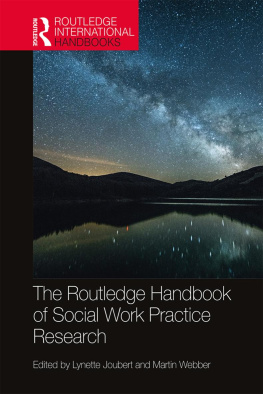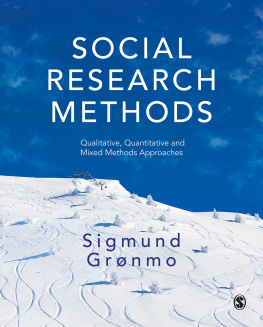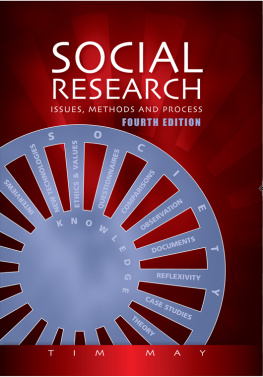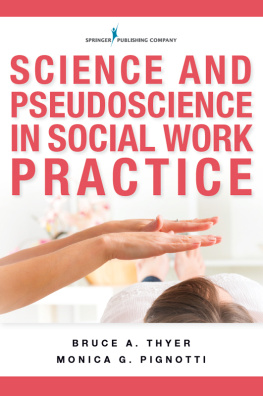Why Do I Need Research and Theory?
Social work students often have difficulty understanding why they must take theory and research courses and frequently enter the helping professions believing that personal experience is the best evidence for professional helpers. New research supports that, if left unexamined, personal beliefs can impede evidence-based practice. Why Do I Need Research and Theory? is a supplement to social work research methods courses and theory texts at the undergraduate and masters level. In addition to its wealth of practical guidance, this book offers insights into the importance of research in social work practice, the effect of beliefs on learning, and the impact of students research-related anxiety on learning. Students are encouraged to critically reflect on the epistemological beliefs and development that underlie their attitudes toward research and theory. Evidence-based research and student quotes support chapters that are written in a conversational tone. Discussion questions provide opportunities for students to develop a professional identity. This book addresses concepts missing in social work texts: leadership, epistemology, learning anxiety, and learning theory. Relevant connections to social work practice and the 2015 CSWE EPAS are prevalent throughout the book.
Dr. Jennifer Anderson-Meger is a professor and ethics fellow at Viterbo University. She has won awards for excellence in teaching and research. Dr. Anderson-Meger serves on the State of Wisconsin MPSW Examining Board and has been a trainer on boundaries and ethics. Her research focus is epistemology in social work.
This book is essential reading for social work learners in order to dispel some notions about the social work profession. As the author explains: caring, hard work, and personal experience are not enough. Dr. Anderson-Meger states, It is a demanding profession that requires a solid knowledge base, critical thinking, and a sophisticated skill set. This book will both guide social work learners in the profession and support the importance of the learning of skills for the professionals.
Dr. Terry Tirrito, Capella University
Why Do I Need Research and Theory? addresses the questions and challenges I face in the course room, daily. Why do I need to take this research class? What is critical thinking? Engaging yet scholarly, this book contains convincing real world arguments for the ethical importance of research knowledge. I no longer have to scramble around for resources to address these issues!
Zulema Suarez, Capella University
First published 2016
by Routledge
711 Third Avenue, New York, NY 10017
and by Routledge
2 Park Square, Milton Park, Abingdon, Oxon, OX14 4RN
Routledge is an imprint of the Taylor & Francis Group, an informa business
2016 Taylor & Francis
The right of Jennifer Anderson-Meger to be identified as author of this work has been asserted by her in accordance with sections 77 and 78 of the Copyright, Designs and Patents Act 1988.
All rights reserved. No part of this book may be reprinted or reproduced or utilized in any form or by any electronic, mechanical, or other means, now known or hereafter invented, including photocopying and recording, or in any information storage or retrieval system, without permission in writing from the publishers.
Trademark notice: Product or corporate names may be trademarks or registered trademarks, and are used only for identification and explanation without intent to infringe.
Library of Congress Cataloging in Publication Data
Names: Anderson-Meger, Jennifer, author.
Title: Why do I need research and theory : a guide for social workers / by
Jennifer Anderson-Meger.
Description: New York : Routledge, [2015]
Identifiers: LCCN 2015042339 | ISBN 9781138833357 (hardback : alk. paper) |
ISBN 9781138833364 (pbk. : alk. paper) | ISBN 9781315735498 (ebook)
Subjects: LCSH: Social serviceResearch. | Social work education. | Social
servicePractice.
Classification: LCC HV11 .A584 2015 | DDC 001.402/43613dc23
LC record available at http://lccn.loc.gov/2015042339
ISBN: 978-1-138-83335-7 (hbk)
ISBN: 978-1-138-83336-4 (pbk)
ISBN: 978-1-315-73549-8 (ebk)
Typeset in Adobe Caslon and Copperplate Gothic
by Wearset Ltd, Boldon, Tyne and Wear
This book is dedicated to my family and to all the students I have worked with. The world is a better place because of you.
The purpose of this short book is to help students understand their own learning and epistemological belief system in order to become effective students and social workers. This book is ideally used as a companion reader in social work research methods courses; however, faculty may find additional uses (see How to Use This Book section). Each chapter can stand alone or be used in combination with various classes. This book was written with several goals in mind:
- Students in social work will make very complex decisions in the practice world. Without awareness of how they are making these decisions and what kinds of knowledge they are using to inform their decisions, students risk making harmful mistakes. The first goal of this book is to help students identify their own belief systems and how those beliefs impact their learning and practice as a social worker.
- Beliefs about knowledge are correlated with the ability to think critically and use metacognitive processes (reflective thinking about thinking), reasoning, and judgment. Students will become aware of how they learn and the beliefs they hold about knowledge. This awareness enhances their ability to deal with the complex problem solving social workers face.
- The third goal is to understand that leadership is an important skill base in social work practice and for the future of the profession. Students at the BSW and MSW level need leadership skills to function in a complex, multi-system profession. Leadership is not something that comes after years of experience. It is developed in undergraduate and graduate classrooms and implemented in field education.
- The fourth goal is to understand how research skills, critical thinking skills, and learning how to learn are fundamental to the future of the social work profession. Students will need to demonstrate these skills immediately in the practice world. This book highlights the importance of this development and provides faculty with suggestions for improving the classroom environment to reach this goal.
Undergraduate social work students typically take social work research methods in their junior or senior year. Graduate students will typically take social work research methods in the first year of a two-year graduate program. Based on my own research and the literature, social work students have a difficult time understanding why they have to take a research methods course when they want to practice. Students often express the feeling of, I just want to get through this. Social work students are frequently coming into the profession based on personal experiences and this experience has led to a belief system that experience is the best teacher and that evidence-based practice or using systematic methods to support interventions is not a valid way to determine efficacy. The beliefs students hold about knowledge and how knowledge is constructed can become a barrier for their learning about social work practice. This book contains numerous quotations from social work students collected during my research on epistemological development in social work. The quotations help students and faculty understand where students are in their development and what their view of reality is for social work and social work education.






